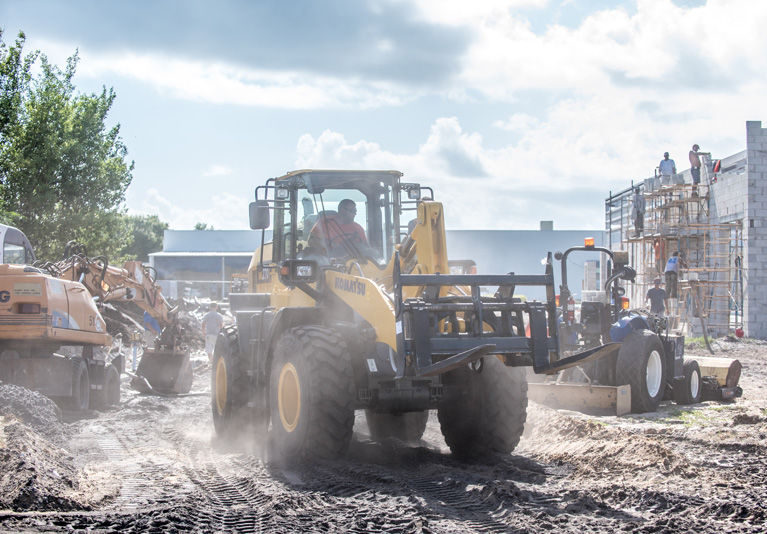
Retail developers have identified cost-conscious consumers as an underserved market on the Vero mainland, and they have several low-cost retail stores planned or under construction along U.S. 1 and State Route 60
Leading the way is Hanlex Development LLC from Orlando, which is building two Dollar General stores in Indian River County.
One is under construction near Velde Ford at 580 U.S. 1 and should be open later this year, while the second is planned for the Oslo Road-Old Dixie Highway corner at 950 Old Dixie, said Michael Yurocko, a broker and vice president of SLC Commercial Realty & Development. A typical Dollar General store is about 9,000 square feet and carries a wide variety of discounted merchandise, including groceries, cosmetics, clothing, toys, office supplies and home goods.
Hanlex is considered the “preferred” Dollar General developer for more than a half-dozen south and central Florida counties, including the Treasure Coast, according to the Hanlex website. Dollar General, founded in 1939 and based in Goodlettsville, Tennessee, has 12,719 stores in 43 states. In 2015, its net income increased more than nine percent to $1.17 billion.
Hanlex is expected to sell the businesses to investors after they are developed, Yurocko said.
Meanwhile, south Florida developer Roberts Equities is building a 15,000-square-foot free-standing Goodwill store at 1066 U.S. 1, said Randy Tulepan, vice president of Roberts Equities LLC.
Roberts Equities purchased the 3.65-acre bank-owned parcel on the east side of U.S. 1 in March 2015 for $1.25 million. The property, which formerly was the location of a Lincoln Mercury dealership, extends from 10th Place on the south to 11th Street on the north.
A site plan provided by Tulepan shows the Goodwill at the back of parcel, surrounded by parking. A restaurant, a yet-to-be-named retail store and a 7,000-square-foot O’Reilly Auto Parts store will occupy the front of the property, along U.S. 1.
In addition to the new Dollar General and Goodwill stores, Yurocko said word on the street is a developer has in the works a discount Aldi supermarket that will occupy part of a 9.5-acre parcel on the south side of State Road 60 just east of Applebee’s restaurant.
“There’s land under contract with a prominent South Florida developer to build Aldi and another [big box] retail store” on the site, Yurocko told 32963.
Tulepan said he too has heard about Aldi coming to Vero Beach.
Records show the landowner is Vero Capital LLC, which apparently has a contract with the developer who plans to build the Aldi and big box retail store. Vero Capital purchased the property for $1,937,500 in April 2004, as an unprecedented run-up in real estate prices was underway, and held onto it through the downturn when it lost much of its value. The market has now restored most of that value.
Aldi is known for its no-frills grocery experience with few workers in the stores compared to a brand such as Lakeland-based Publix. The Albrecht family founded the chain and the first Aldi opened in Germany in 1961. Headquartered in Batavia, Illinois, the discounter has more than 1,500 stores and 22,000 workers in 34 U.S. states. Aldi has experienced steady growth in the U.S. since its American debut in Iowa in 1976.
The closest Aldi to Vero is in Port St. Lucie.
Yurocko said the Dollar General, Goodwill and Aldi stores are part of a trend of Americans looking for affordable retail alternatives after the devastating Great Recession that officially began in 2007 and ended in 2009, but which lingered in its effects for several more years, altering people’s buying habits.
“Lower-cost alternatives are thriving and higher-end retailers may not be doing as well,” Yurocko said. “Vero Beach is a tale of two cities, beachside and mainland, and on the mainland side the market is demanding discount retail.”
Tulepan said discount stores no longer carry the stigma that they are visited by only poor people. Middle-income and well-to-do folks also shop there now.
“Those chains, those particular retailers, happen to be the strongest financially at this point and their expansion plans are aggressive,” Tulepan said.
“When the economy crashed, discount was everything and they were ahead of the curve. The image of those stores are changing. They’re real stores. There’s value there.”
Tulepan said an Aldi supermarket, for example, is half the square footage of a traditional grocery such as Publix, so Aldi has more flexibility to find sites because the parcel doesn’t have to be as big. An Aldi is typically in the 12,000- to 20,000-square-foot range, he said.
‘Every market at the moment is ripe for [discount stores],” Tulepan said.



